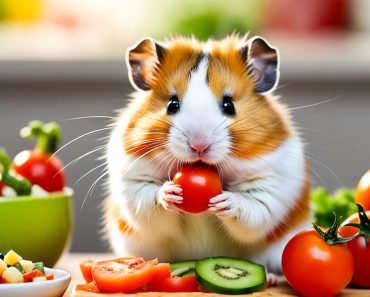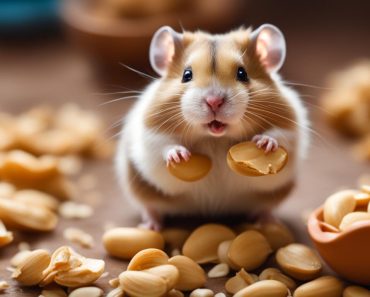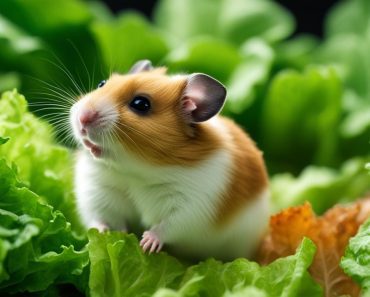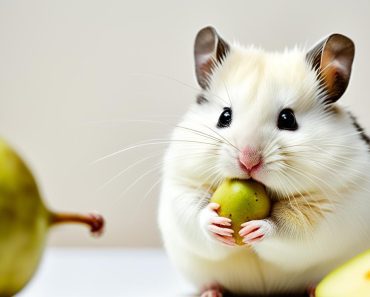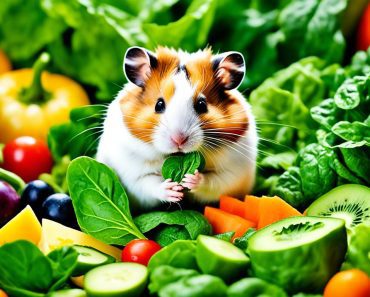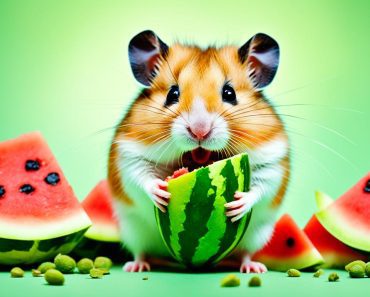As a hamster owner, you may have wondered: can hamsters eat raspberries? Well, good news! Hamsters can indeed enjoy the occasional raspberry treat. However, it’s important to proceed with caution and provide them in moderation.
Raspberries are a delicious and nutritious fruit packed with essential nutrients like fiber, carbohydrates, protein, and various minerals and vitamins. They can offer some health benefits to your hamster, such as improved blood flow and protection against certain diseases. However, it’s crucial to be mindful of the high sugar content in raspberries, as excessive consumption can lead to diarrhea, diabetes, and obesity in hamsters.
When offering raspberries to your hamster, ensure they are appropriately cleaned, soft, and served at room temperature. It’s essential to consider your hamster’s breed and size when determining portion sizes. Syrian hamsters, being larger, can enjoy up to two raspberries every fortnight, while smaller breeds like dwarf hamsters should limit their intake to one raspberry per fortnight.
Can Hamsters Eat Raspberries? Yes, but provide in small amounts.
- Hamsters can eat raspberries in moderation.
- Raspberries are packed with nutrients like fiber, carbohydrates, and various vitamins and minerals.
- Excessive raspberry consumption can lead to diarrhea, diabetes, and obesity in hamsters.
- Ensure raspberries are washed, soft, and served at room temperature.
- Portion sizes should be adjusted based on your hamster’s breed and size.
Nutritional Value of Raspberries for Hamsters
Raspberries offer a range of nutritional benefits for hamsters. They are low in calories and high in fiber, making them a healthy snack option.
Raspberries contain a variety of minerals and vitamins that are essential for hamster nutrition. These include:
- Calcium: Supports bone health and muscle function.
- Manganese: Important for metabolism and antioxidant defense.
- Phosphorus: Helps with energy production and bone formation.
- Magnesium: Plays a role in enzyme function and protein synthesis.
- Copper: Essential for iron metabolism and collagen synthesis.
- Vitamin E: Acts as an antioxidant and supports immune health.
- Vitamin C: Important for immune function and collagen production.
- Vitamin K: Essential for blood clotting and bone health.
- Vitamin B3 and B6: Involved in energy metabolism and nervous system function.
These nutrients can support the overall health and well-being of hamsters. However, it is important to feed raspberries in moderation to avoid overconsumption of sugar and potential health issues.
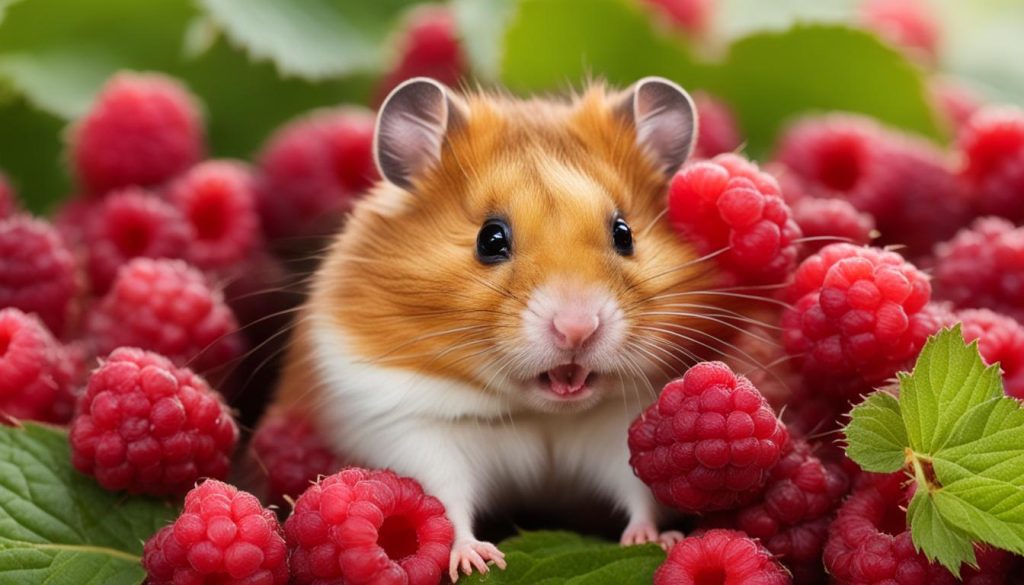
Potential Risks of Feeding Raspberries to Hamsters
While raspberries have many benefits, there are also potential risks associated with feeding them to hamsters.
The calcium-to-phosphorus ratio in raspberries may pose a problem as excess phosphorus can bind to calcium in the hamster’s body, potentially leading to issues with bone formation and dental health. It is essential to maintain a proper calcium-to-phosphorus ratio in a hamster’s diet to prevent these complications.
Raspberries also contain natural sugars, which, when consumed in excessive amounts, can contribute to dental problems and weight gain in hamsters. Therefore, it is important to limit the intake of raspberries to prevent these issues related to excessive sugar intake.
Additionally, the low fiber and protein content in raspberries make them insufficient as a sole food source for hamsters. While raspberries provide some nutrients, hamsters need a balanced diet with a variety of foods to meet their nutritional requirements.
To prevent the potential risks associated with raspberries, it is crucial to offer a balanced diet to hamsters that include a variety of foods with adequate fiber, protein, and other essential nutrients. Raspberries can be included in moderation as a treat or a supplement to the main diet.
Serving Raspberries to Hamsters
When it comes to serving raspberries to your hamster, there are a few important factors to consider. Let’s dive into the proper way to feed raspberries to your furry friend.
Washing and Preparation
Before offering raspberries to your hamster, it is crucial to wash them thoroughly to remove any pesticides or dirt. Rinse the raspberries under running water and gently pat them dry with a clean paper towel.
Once the raspberries are clean, make sure they are soft and at room temperature before serving them to your hamster. This ensures that the raspberries are easy for your hamster to consume and digest.
Portion Sizes
Portion sizes are important when it comes to feeding raspberries to hamsters. Syrian hamsters, being larger in size, can be given up to two raspberries every fortnight as a treat. On the other hand, smaller breeds like dwarf hamsters should only consume one raspberry per fortnight. Keep in mind that raspberries should be provided as a supplement to your hamster’s diet, not as a main food source.
Feeding Tips
When serving raspberries to your hamster, it is best to cut them into small pieces that are not larger than their paw. This makes it easier for your hamster to bite and chew the raspberries without any issues. Offering smaller pieces also helps in portion control.
It’s important to monitor your hamster’s consumption of raspberries and ensure that they are not overindulging. Moderation is key to prevent any potential health issues that can arise from excessive sugar intake.
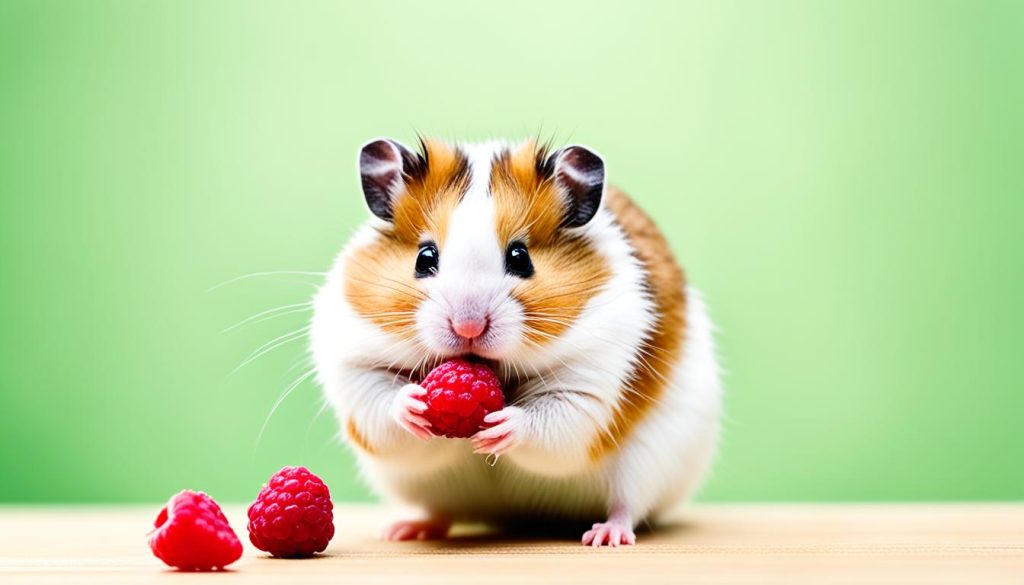
Remember, raspberries should be given as a treat and not as a substitute for a balanced hamster diet. It’s crucial to provide a variety of nutritious foods along with raspberries to meet your hamster’s dietary needs. By following these guidelines, you can safely incorporate raspberries into your hamster’s diet and offer them a tasty and healthy snack option.
Including Raspberries in a Balanced Hamster Diet
Raspberries can be a tasty and nutritious addition to your hamster’s diet. To ensure a balanced meal plan, it’s important to incorporate raspberries alongside other essential foods.
First and foremost, provide your hamster with high-quality feeding pellets that are specifically formulated to meet their dietary needs. These pellets are packed with essential nutrients and fiber that are necessary for your hamster’s overall health and well-being.
In addition to feeding pellets, you can offer fresh vegetables, herbs, and fruits in small amounts to provide additional nutrients and variety. When introducing raspberries, it’s important to remember that moderation is key. Limit the quantity of raspberries to prevent excessive sugar intake and potential health issues for your hamster.
Another crucial component of a hamster’s diet is special hay that is high in fiber. This helps support their digestive system and keeps their teeth healthy. Make sure to provide fresh hay regularly to ensure your hamster has access to this important dietary component.
Lastly, consider incorporating high-protein snacks like nuts or mealworms into your hamster’s diet. These snacks can help meet their protein needs and provide a welcome treat for your furry friend.
Remember to provide clean, fresh water at all times to ensure your hamster stays properly hydrated. Hydration is essential for their overall health and well-being.
By incorporating raspberries alongside feeding pellets, fresh vegetables, special hay, and high-protein snacks, you can create a well-balanced hamster diet. This will help ensure that your hamster receives the necessary nutrients for optimal health while still enjoying the deliciousness of raspberries.
Conclusion
Hamsters can enjoy the delicious taste and benefits of raspberries as part of their diet, but it is important to exercise moderation and take certain precautions. Raspberries provide hamsters with improved blood flow, antioxidant properties, and fiber for proper digestion. However, excessive consumption of raspberries can have negative consequences, such as diarrhea, diabetes, and obesity in these little furry friends.
To ensure the well-being of your hamster, serve raspberries in appropriate portion sizes that are suitable for their breed and size. Remember, while raspberries are a great treat, they should be incorporated into a balanced diet that includes other nutritious foods. Offer a variety of snacks that meet their dietary needs and provide essential nutrients.
When caring for your hamster, always prioritize their health and safety. Make sure to consult a veterinarian for specific hamster care tips and guidance. It’s important to offer a range of healthy snacks that promote their overall well-being. Alongside raspberries, consider safe fruits like apples and pears, and other snacks like high-quality feeding pellets and fresh vegetables.
By following these hamster care tips and providing a balanced diet, you can ensure that your furry friend stays both happy and healthy for years to come. Remember, moderation is key when it comes to serving raspberries and other snacks to your hamster. Enjoy watching your pet relish these treats while taking care of their nutritional needs!

